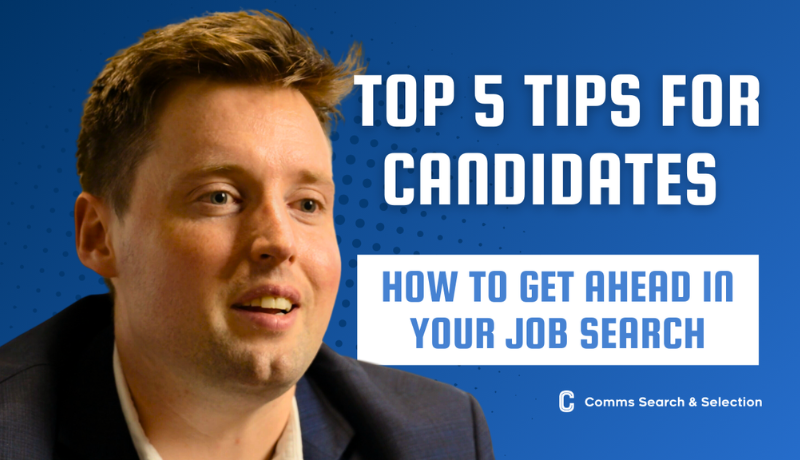
Job Search & Career Advice
Top 5 Tips for Communications and Investor Relations Candidates
21 October 2024 by Max Forsyth
Get Ahead In Your Job Search
Whether it be in today's incredibly competitive job market or in a more "normal" market, landing your next role in Communications or Investor Relations (IR) isn’t just about having the right skill set and experience—it’s about how you present those skills and that experience, how you prepare, and the little details that can make a big difference. It's essential to differentiate yourself from other candidates and get ahead of the competition at every stage of the recruitment process.
"This is not about slightly exaggerating the responsibilities on your CV, using AI to write your cover letter, or lavishing the interviewer with praise. It is about a few small tweaks and improvements to your CV, making sure you are aligned with the job advert and description, doing a little bit more and better research before your interview, bringing your findings up at the interview and showing just a little bit of gratification and enthusiasm through the process."
In his latest video, MD and Founder of Comms Search & Selection, Max Forsyth, breaks down five tips that every communications and IR job seeker should know to stay ahead of the curve in just over 90 seconds.
Max's Tips:
1. Craft a Great CV
It all starts with a well-crafted CV. This is your first opportunity to make an impression, and a good CV is more than just a list of jobs. When structuring your CV, I always advise candidates to list their roles in chronological order, ensuring each position is broken down into two clear sections: key responsibilities and key achievements.
Key responsibilities should explain what you did day-to-day, but the real differentiator is in the achievements. Employers want to see the impact you’ve had in your previous roles, and wherever possible, these should be quantifiable. Did you improve employee engagement by 20%? Designed and led a proactive media strategy that resulted in X amount of leads and £/$ of new business? Supported ExCo in delivering exceptional investor roadshows and analyst calls that resulted in an increased share price? These are the kinds of metrics that can help you stand out.
2. Align Your Experience with the Job Description
It might sound obvious, but it's surprising how many candidates fail to tailor their CVs and applications to the specific role they’re applying for. Before you hit ‘send,’ take a close look at the job advert. What are the hiring manager and company actually looking for? Does your skill set clearly align with their needs? Make it easy for them to see the fit between your experience and the role.
3. Do Your Research
One of the biggest mistakes candidates make is underestimating the importance of research ahead of an interview. A hiring manager wants to know that you’re genuinely interested in their company—not just the role. If the company is publicly listed, look at its annual reports. Understand its strategy, get familiar with the leadership team, and take note of the key stakeholders.
Even for privately held companies, there’s usually plenty of information available online. What are the key initiatives they’re focusing on? How do they position themselves in the market? The more you know, the better equipped you’ll be to demonstrate how your experience aligns with their strategy.
4. Show Your Research During the Interview
Everyone walks into an interview ready to discuss their experience and skills—but not everyone goes the extra mile to showcase their research. This is where you can truly differentiate yourself, particularly in the early interview rounds. Use the research you’ve done on the company to bring insightful, informed points into the conversation. For instance, you could reference a strategic objective the company has highlighted in its reports and explain how your skills and experience would help support it. Or a recent news article on the company and how you would manage the response.
Hiring managers are always impressed by candidates who show they’ve thought about how they’d fit into the organisation and make an impact from day one.
5. Follow Up with a Thank You Note
This might seem like a small step, but following up after an interview with a brief thank you note can leave a lasting impression. Whether it’s through email or LinkedIn, a quick message to thank the interviewer for their time and reiterate your interest in the role can go a long way.
It's surprising how few candidates take this step, yet it's an opportunity to demonstrate professionalism and enthusiasm. In my experience, it’s often the candidates who go the extra mile who get remembered.
Next Steps
At Comms Search & Selection, we work with talented candidates across the UK and US, helping them secure career-defining roles in communications and IR. If you’re ready to make your next career move, or you are looking to hire for your team, don’t hesitate to get in touch.